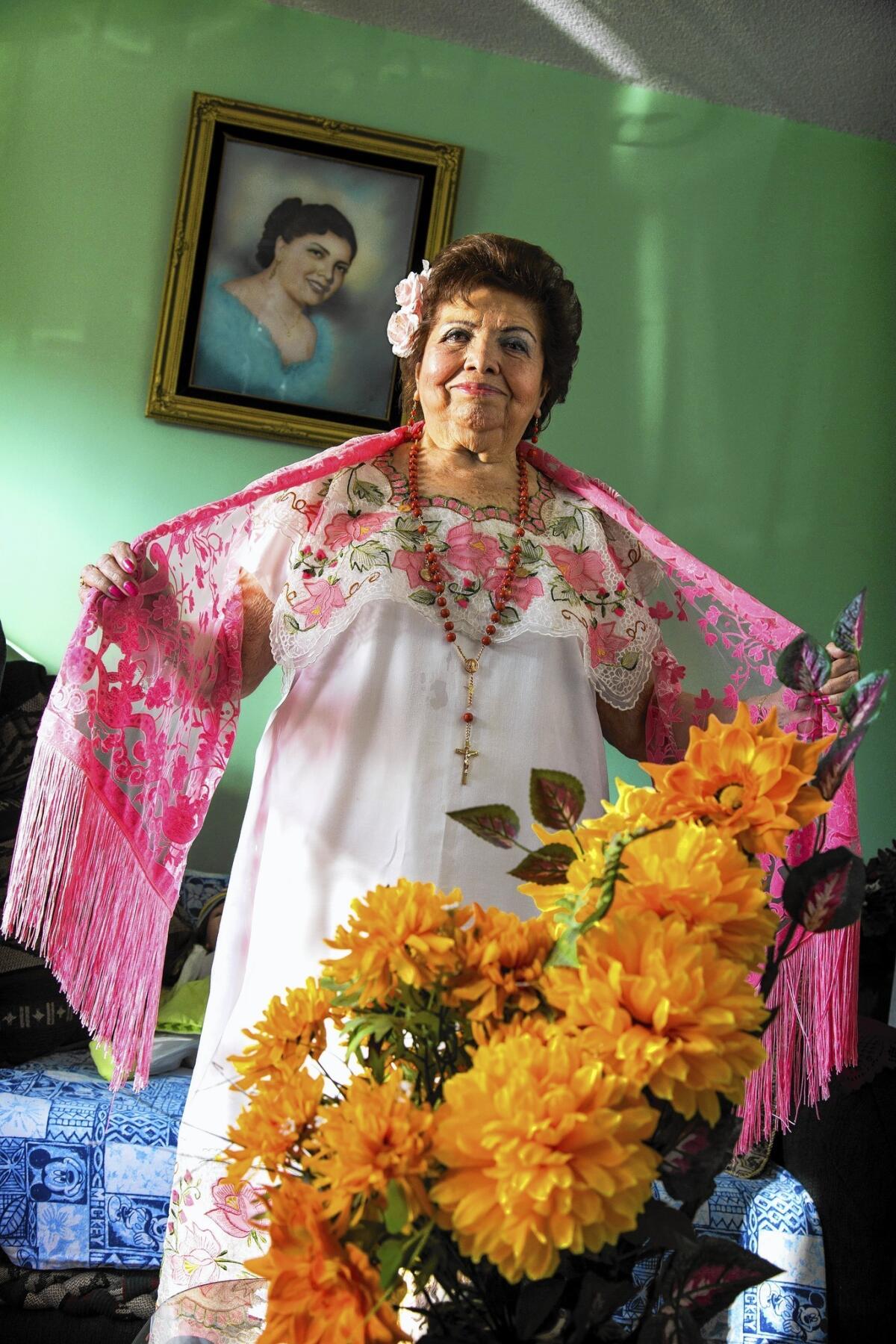Exhibit highlights women who made mariachi history

- Share via
Rosa Quirino liked to perform with leather huaraches on her feet and a shawl criss-crossed over her chest, in a nod to Pancho Villa.
When men teased her as she sang, she would tell them: “Gentlemen, we are working.” Then, she’d pull out her gun.
The year was 1903, and Doña Rosa, a mariachi from Mexico who began playing violin at age 13, was a rare sight.
Her story and others are being featured in an exhibit this month at the San Gabriel Mission Playhouse. The show covers more than a century of history surrounding female mariachis: ladies who found success — starring on television, scoring sponsors and performing internationally — at a time when the Mexican music genre was ruled entirely by men.
“They were seen, they were heard, they performed in front of thousands of people,” said Leonor Xochitl Perez, the exhibit’s organizer. “But today, they are hardly remembered.”
Perez, a performer herself, set out 13 years ago to document the tales of the pioneras while pursuing a doctorate in education. She realized how little had been written about female mariachis.
She chased online tips and plugged into the mariachi grapevines to track down musicians — grandmothers and great-grandmothers now living in Mexico City, Texas and Kansas.
Some had put down their guitars and trumpets long ago. Others, like Francis Angulo, still perform — even if it’s just among friends.
“I hear a mariachi play and it’s like you set me on fire,” the 83-year-old said. “I have to dance, I have to sing, I have to do something.”
The mother of two spent 12 years performing with Las Adelitas, an all-girl mariachi group formed in Mexico in 1948. They traveled, in braids and ruffled dresses, across Mexico, South America, Cuba and the United States, entertaining packed crowds. They starred in movies and were sponsored by beer and cigarette companies.
Angulo eventually left the group to get married and care for her sons. She found work as a nanny in Los Angeles and her mariachi fame faded into the past.
When Perez tracked her down, she couldn’t believe it.
“It was like a bomb, a dream,” said Angulo, who lives near USC. “After all these years, I never imagined someone would care enough to recognize me.”
For decades, female mariachis were overlooked by scholars and the public, said Dan Sheehy, director and curator of the Smithsonian Folkways Recordings in Washington, D.C.
“This is a story that hasn’t been told,” he said. “It makes the world of mariachi bigger and richer in meaning and beauty.”
Among other pioneers Perez highlights in the exhibit:
Las Rancheritas from Alamo, Texas: The four sisters were the first mariachis invited to perform in a war zone in 1968. They flew to Vietnam to entertain the troops.
Mariachi Estrella de Topeka: Formed in the late 1970s, the group gained much success in Kansas and was on the verge of a record deal when tragedy struck. During a hotel performance, the ceiling collapsed and four members were killed.
Isabel Lopez Soto: A member of several all-female mariachi groups, she also famously stood up for women at Garibaldi Square, Mexico’s City mariachi plaza. Through the 1970s, male mariachis would harass women who showed up at the plaza to compete for work. Lopez Soto made headlines for fighting back.
Perez, a native of East L.A., has waged her own battle to keep performing. When she was a child, her parents disapproved of mariachi music. They thought it was not lady-like, more fit for a bar.
As an adult, landing jobs while caring for her daughter and attending college proved so tough she stopped playing.
This year, Perez, 52, began performing once more after a 10-year hiatus.
“I don’t want people to think about mariachi music and only think about men,” said Perez, who is an artistic projects manager at the San Diego Symphony. “I want everyone to know women have done their part, too.”
And they’ve done it just as well, she said.
Case in point: the Mariachi Divas de Cindy Shea.
A photo that caps off the exhibit shows Shea, the band’s founder and director, smiling proudly in a black and purple suit.
Mariachi Divas has released 10 albums and traveled nationwide. They are also the first mariachi to win a Grammy — two of them.
“The men will call me and ask me for advice,” said Shea, whose group will perform a concert March 29 at the Mission Playhouse.
“They’ll tell me, ‘How do you do it?’ and ‘Can we join your group?’ I tell them, ‘No, no. Girls only.’ ”
esmeralda.bermudez@latimes.com
More to Read
Sign up for Essential California
The most important California stories and recommendations in your inbox every morning.
You may occasionally receive promotional content from the Los Angeles Times.









